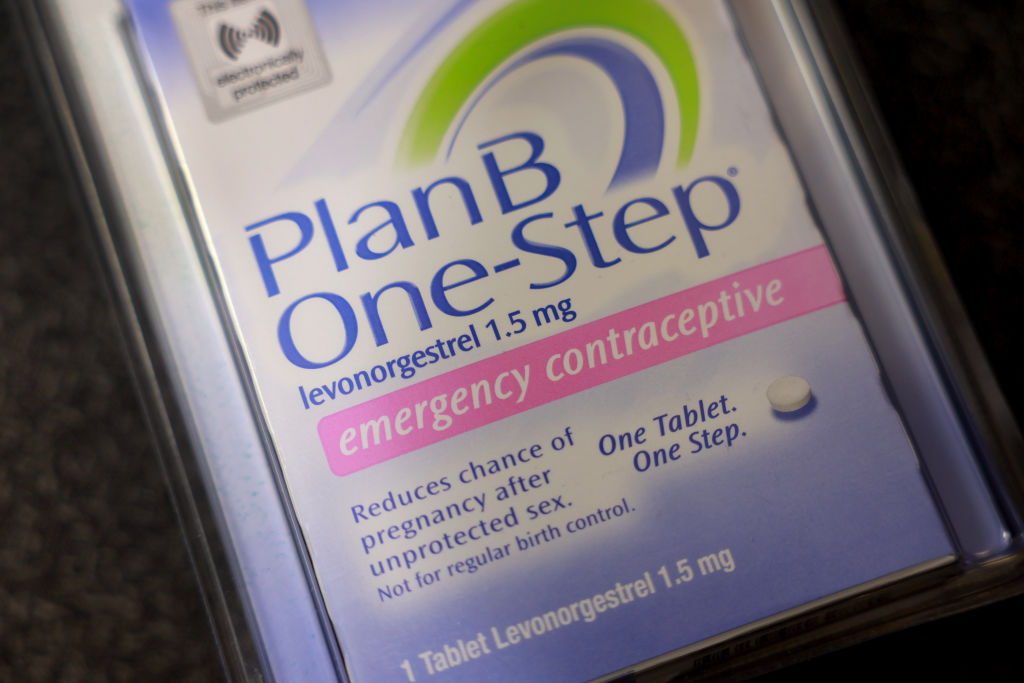What You Need To Know About Plan B — The Morning-After Pill
Curious About Plan B And The Side Effects? We Got You Sis!
A night of unprotected sex can cause anxiety if you’re not prepared for pregnancy, but there are options to help prevent it, such as the morning-after pill, commonly known as Plan B. This over-the-counter medication is easily accessible to everyone and is available in all 50 states, including those with tight abortion restrictions.

Source: Joe Raedle / Getty
Here’s how it works.
As noted by Cosmopolitan, Plan B contains a large dose of levonorgestrel, a synthetic chemical that mimics the hormone progesterone, which prepares the body for pregnancy. When you take the pill, the levonorgestrel goes into defense mode by temporarily delaying ovulation (the release of an egg from the ovary), so no egg can meet the sperm that’s entered your body. “No egg, no fertilization, no pregnancy,” the Plan B website states.
It’s most effective when taken as soon as possible after unprotected sex, but it can work up to 72 hours or, in some cases, five days, depending on the specific pill you use. There are a few different types, such as Plan B One-Step and Take Action, which are both available over-the-counter without a prescription at pharmacies and some online stores. Planned Parenthood notes that if taken properly, Plan B can help to reduce the risk of pregnancy after unprotected sex by 89%. However, the pill cannot prevent or end a pregnancy that is already in the process of maturation.
It’s important to clarify that Plan B and the abortion pill are not the same. Plan B, or emergency contraception, is used to prevent pregnancy after unprotected sex, while the abortion pill, also known as medication abortion, is used to end an existing pregnancy.
Per Public Good News, the abortion pill involves taking two medications: mifepristone, which halts the pregnancy, and misoprostol, which causes cramping and bleeding to empty the uterus. This method is FDA-approved for use within the first 10 weeks of pregnancy, though the World Health Organization states it can be safely used up to 12 weeks. One of the key advantages of the abortion pill is that it allows individuals to manage the process privately and in the comfort of their own homes. Additionally, emergency contraception is not meant to be a regular form of birth control, but rather a backup option in cases of contraceptive failure or unprotected sex.

Source: AlexanderFord / Getty
Where can you purchase it?
Plan B is available over-the-counter in all 50 states and no prescription, age requirement, or ID is needed for purchase. You can buy it for anywhere between $10 and $50 at most drugstores or pharmacies, depending on whether you choose the brand-name or generic version (both work the same). If cost is a concern, you can also check with a nearby Planned Parenthood or local health department for free or low-cost options.
What are the side effects of Plan B?
According to the Mayo Clinic, common side effects of Plan B include headache, nausea, vomiting, breast tenderness, abdominal pain, dizziness, fatigue, and changes in menstrual bleeding (which may arrive earlier or later than expected, be heavier or lighter, or involve spotting). Most of these side effects are mild and temporary.
If you are allergic to the active ingredient inside the pill, talk to your doctor first before taking the medication. It’s also important to note that the pill may be less effective in people with a weight of 155 pounds or higher, according to Dr. Tia Jackson-Bey.
“If you’re worried that Plan B may not work for you because of your weight, consider reaching out to your ob-gyn and using an alternative form of emergency contraception, like the copper IUD,” the health expert told Cosmopolitan in a Jan. 2 interview. She added that it “is the most effective emergency contraception out there.”
RELATED CONTENT: Are You Taking Plan B Correctly? 6 Mistakes Women Make With The Morning-After Pill




